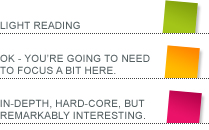Unfortunately, there is a reason not to use HTML5 tags – Internet Explorer 7.
HTML5 – Some Thoughts (Part 3 of 3) |

|
HTML5 – Some Thoughts (Part 2 of 3) |

|
The keyword and description meta-tags are still used by Google and other search engines, and so will the new HTML5 tags.
HTML5 – Some Thoughts (Part 1 of 3) |

|
Previous versions of HTML were designed specifically for markup, so they only worried about how the words and images were placed on the page relative to each other. No care at all was given to the meaning or relative significance of the words. HTML5 brings us much closer to a proper XML system by allowing both layout and structural tags, to tell the browser not only where to place things, but also what the various parts of the code represent.
Link Selectors – Handy Little Things |

|
Our current CMS includes a link selector widget which allows the user to select a page or document to which to link. The selector comes in two flavours – one for use from within the TinyMCE editor, and the other for everywhere else. The selector is one of the most useful widgets we have, and […]
jQuery (again) – Understand your scripts |

|
Following on from our previous post about jQuery, more explanation of why it shouldn’t be learned or used in isolation.
jQuery – Not always the right tool |

|
JQuery can be a powerful tool, but it should be used sparingly and only when actually needed.
Creating a Custom Search Engine Part 3 – Displaying Results |

|
This is Part 3 of three articles outlining how to develop a custom search engine for your website.
Creating a Custom Search Engine Part 2 – Searching |

|
This is Part Two of a three-part article on how to create a custom search engine for your website.
Creating a Custom Search Engine Part 1 – Indexing |

|
Part One of a three-part article discussing the basics of creating a custom search engine for your website.
Reasons not to Stick to Standards |

|
Recently, I had a good rant about the importance of using standards. Today, I thought I’d present the other side of the coin: reasons why we should not stick to standards.

